Hawaii has just received two dubious accolades in relation to the cost of being here. And it made us think about how the same problems impact both residents and Hawaii visitors.
First, the state has been ranked as having the most expensive city in America: Honolulu. That, together with NYC. A study by SmartAsset looked to identify the most expensive cities in the U.S., and you needn’t guess far to know that the answer was right here in Hawaii.
Not only that, but the nonprofit Tax Foundation has proclaimed that Hawaii has the greatest tax burden. The foundation says that the current state/local tax rate for 2022 is 14.1%, with the state/local tax burden per person being $8,410.
A comment from Debi, a regular reader, was made today on this point. “Aloha – Ask me to pay a fee to visit the parks, etc., to help maintain and preserve the beauty of the islands, and I am happy to do so. But don’t ask me to pay a fee because your cost of living is too high. It has gone up for everyone, not just those who live in Hawaii. I won’t ask you to offset my living expenses, so please don’t ask me to do the same for you. But, if you want to share a meal together, I’ll bring plenty and extra!”
From another commenter today: “Unsure how you locals afford it. $8 loaves of bread, $7 bags of tortillas! Insane. Locals told us the cost of homes has doubled in 4 years!! Regardless, we had an amazing time and hope we can afford to return…”
Hawaii visitors take notice – you’re not the only ones paying exorbitantly.
Here’s a place where visitors and residents can share the pain. Both experience the same costs, only in different ways. Let’s look at how it works for residents since we’ve discussed Hawaii accommodations, taxes, and fees ad nauseam.
At one end of the extreme in the U.S. sits Honolulu, where a $312k salary equates to leaving you with the equivalent of only a $100k salary. That contrasts with the other end of the scale, such as in El Paso, Memphis, and Oklahoma City, where it only takes just over $100k to leave you with $100k. These rankings take into account both the cost of living (need we say more), as well as income taxes.
Third in line with the most expensive cities to live in, after Honolulu and New York City, is San Francisco. Rankings also reflect the high taxes in Hawaii, New York, and California. The study determined that on that $312k salary in Hawaii, you’ll also owe the state about $25k in income tax. If you are looking for the cheapest U.S. state to live in, it’s where there is no income tax or very little.
The study used Council for Community and Economic Research cost-of-living data. That reflects housing costs, food, utilities, transportation, and other necessities.
High government spending and liabilities in Hawaii are expensive for all. And Hawaii has the 2nd worst individual income tax in the U.S. Other taxes are among the highest too, including Hawaii’s estate tax.
While Hawaii property taxes for full-time residents are low, the extreme cost of Hawaii homes causes the actual property taxes paid to be on par with the national average.
Then visitors and residents pay GET (general excise tax). That’s Hawaii’s equivalent to sales tax, only worse. Studies have found it to be one of the most egregious in the country since it is added to everything, including food, medicine, etc. It is most burdensome for low-income individuals.
Hawaii has the most expensive home cost in the U.S.
The average cost of a single-family residence here went to over $1 million, in 2021, before coming down slightly. It makes it nearly impossible to get into home ownership, resulting in many people leaving the state. Add to that, home construction costs in Hawaii are second only to New York.
Shipping costs are Hawaii’s hidden nightmare.
The cost of bringing everything into Hawaii is far higher than expected. Visitors and residents experience that when shopping for anything in Hawaii. It’s also one of the driving factors in hotel, restaurant, and grocery costs. That is partly due to The Jones Act, a federal shipping law that can result in the cost of shipping to Hawaii being as much as three to five times higher than shipping abroad.
The Jones Act requires that all goods shipped between U.S. ports be transported on ships that are U.S.-built, U.S. flagged, and crewed and owned primarily in the U.S. In addition, competition is extremely limited. It was previously estimated that The Jones Act might cost the average Hawaii household an extra $2,000+ annually.
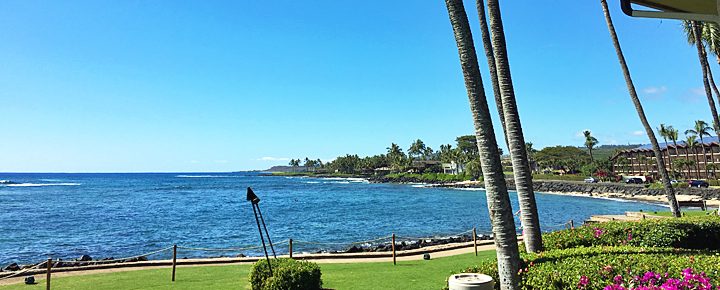
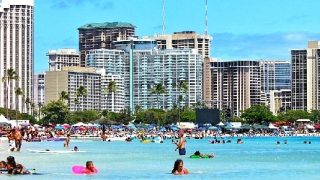
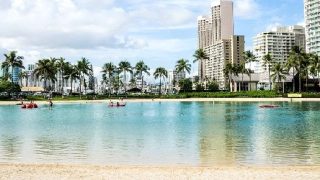
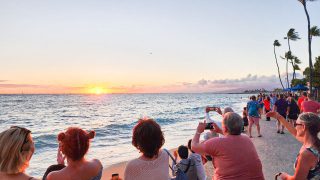
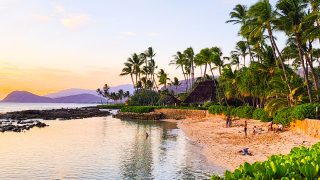
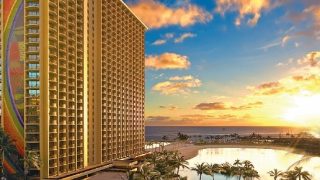
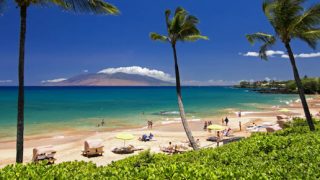
ok, let’s not compare “cost of living” in the same breath than a $300K+ salary. If you make that much, you should pay higher taxes and if you don’t want to pay them, Oklahoma seems to be a viable choice (not for me, thank you!).
Hi! Firstly, love your articles. I grew up in the islands way back in the 70’s. Moved to the mainland in early 80s. Even back then, 40 years ago, it was expensive. For my weekly shopping at Safeway, it was 3 times more on the Island than on the mainland. As someone said, it is expensive to live in paradise. I also agree with another commenter that charging $50 for us to come visit (whether it is legal or not, I’m not sure) but that leaves $50 less than I can spend on local businesses. I choose to shop and spend my vacation dollars with local businesses, not costco, walmart, target. Those who live there I know don’t have that luxury…but for us Local Haoles who come back home to the islands, at least for me, I choose local.
Just don’t generalize “mainland”. As this article correctly states, New York City and San Francisco are just as expensive and I am sure there are many other areas in the US that come close. That said, if people want to make changes, they should not pay for things they don’t need or prices they didn’t compare. For example, the Outrigger Hotel gives Kamaaina discounts, so that’s where I stay when I visit other islands. Also, some restaurants offer Kamaaina discounts, so those are the ones I go to …otherwise, go eat during Happy Hour instead of dinner. Many food items are reduced in the afternoons. Aloha from Maui!
Aloha Jeff and Rob –
I never thought I’d be quoted in one of your articles. It was a kick to be reading along and see my name. Glad I said something nice! Anyway, I am honored.
Mahalo
Hi Debi.
It’s our honor! Thanks for being part of Beat of Hawaii for more than seven years!
Aloha.
We immediately recognize that area in front of the Beach House. We are currently in that area. Yes, the cost has gone up considerably. But, it surely has not stopped people from coming to the islands. There seem to be more people than in the past.
Just fyi: I spoke to HI Park Services Dept wanting to make a May reservation to IAO state park. You had said reservations opened April 17 for May visits. They told me yesterday that it is closed indefinitely til further notice.
Hi Jennnifer.
The information is as we reported. https://dlnr.hawaii.gov/dsp/parks/maui/iao-valley-state-monument/.
Aloha.
NY, CA, and Hawaii. Simply put: Elections have Consequences.
As a very blessed 11 year resident (Waikiki and Kona) and yearly visitor for the 8 years prior-the answer is planning and shopping around for the best prices! Safeway for Friday $5 specials, and sign up for JustforU savings on top of weekly ad sales. Target for more variety of some foods and their Circle offers to earn $ back. SackNSave sales to earn Makai rewards/Hawaiian Miles. Walmart for everything else, especially toiletries and paper products. Pay utilities and buy food/supplies with a cash back credit card. Bake your own bread, grate your own cheese, and no reason to pay $9 for gallon of milk when you can get it for under $6! Mahalo BoH for sharing all your great info!
For all we pay in taxes you’d think that would adequately fund a competent government. Sadly, no. I’m no “gub’mint bad!” guy. I want the government to provide services to make everyone’s lives better. What we get in exchange for the highest tax burden is, frankly, embarrassingly poor management and upkeep. Yes, everything costs more here because almost everything is shipped here, but the corruption and criminally negligent mismanagement just means our taxes provide far less than they should. Why nobody has been indicted for HART corruption is beyond me, because something like that can’t be that poorly managed without someone working at a cross purpose. Maybe Milton Choy was involved.
Yes, it costs a lot to live in paradise. Did the article mention the benefits of living in Hawaii (happiness, longevity, climate, aloha most of the time)?
How do I manage?
We live in a rural area, so fish, meat, home grown produce, eggs and milk are readily available and reasonable at our farmers market. We buy in bulk from Costco meats, milk, butter, sometimes eggs and other more costly items. I also cook better meals than most restaurants, so that eliminates a costly venture. We time our trips to Kona to include those Costco runs. Otherwise, the daily hikes, swimming and snorkeling keep us in shape and occupied so there is no need for a unneeded shopping trip just for the sake of spending money.
Nothing new about the high cost of living, especially on Oahu. I had a 2nd cousin who was born on Oahu. He spent 20 years on the HPD. Between the high cost of living and low salaries he left and joined one of the local PDs in the Seattle area. Gave up 20 years seniority for a pay raise and lower cost of living.
Well the most outrageous thing that Hawaii government has said is they want to charge people to come to Hawaii if they try that Thay will end up in court forever that’s interfering with interstate commerce it’s illegal… They don’t have a right to charge anybody from going from state to state..that’s how greedy the state government is.thats breaking the law ..
I’m visiting Kauai now as I write this. Did my “miscellaneous” grocery shopping at Foodland in Princeville (after going to Costco) and I got three bags of groceries (granted there was some alcohol but not a lot) and it came to around $250. Wow! How do the locals do it.
We are transplants from island life in British z Columbia, Canada. We have lived on Kauai for 9 years. We own the condo we live in and our property taxes are low. We find the cost of living here less than in BC! Gas is less, alcoholic bevvies half the price and food is comparable or a bit less , as we shop local. There is a 12% tax on goods and services. Oddly enough, we are comfy living and working here!
I started vacationing to Hawaii back in 1989 and have traveled there every year at least once for over 30 years. Once I discovered the advantages of renting a condo is when my eyes were opened to what local food prices were really like. Sticker shock, most definitely, but we considered it just the cost of vacationing in our home away from home. Yes, the Jones Act certainly adds a lot to the costs of getting “stuff” to Hawaii but it is surprising that the states US House and Senate elected officials have apparently done little or nothing to either get an exemption for the Hawaiian Islands or get the Act abolished. When I get on Island I do not bat an eye at the costs of shopping for necessities upon arrival.
As a visitor I ride the Bus on Oahu. I stay at the Ilima hotel. Both good budget friendly choices. On Lanai I stayed at the Hotel Lanai. It was the cheapest of the 3 hotels. I didn’t rent a car. They had a shuttle that went around Lanai. I don’t go to the fancy restaurants.
To begin with anyone who lives here knows that things cost more. It is the price for living in year round summer. The winter months are awesome. It is definitely why many live here and why many take vacations here.
That being said, would I want to raise a family of 4 here? No! Public schools are really bad. Healthcare is not great. And food is really expensive. It is that way whether you are a resident or tourist.
My taxes on a $2.2 million home is a little over $7000. My next door neighbor here in Kona who actually lives in Massachusetts, pays over $7000 in taxes on a $800,000 home.
How do I pay the high costs? With education and good investments.
Paradise is not supposed to be free.
Thank you gentleman.
Hi Kelly.
Thanks for your input on this and so many other comments!
Aloha.